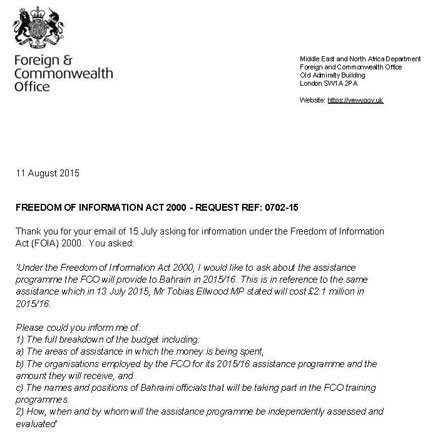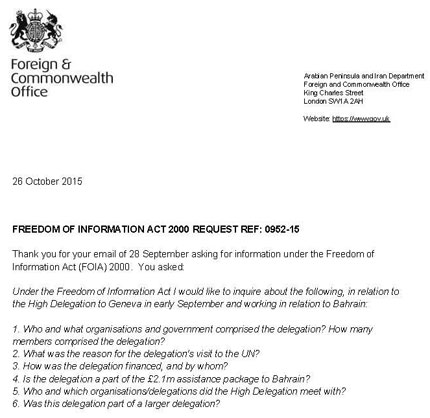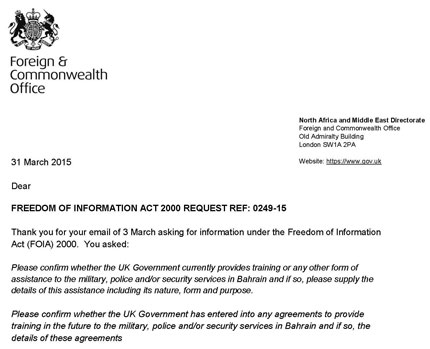
|
 |
 |
|
|
|
|
|
|
|
|
|
|
|
|
|
|
|
|
|
|
|
|
|
|
Promoting Human Rights the British WayThe international human rights community - including states, official international organizations, NGOs, as well as academic and research centres- adopts various approaches and methods with regard to promoting and improving human rights, and protecting them in the face of violations in various parts of the world. However, the dominant feature of the trends of these human rights entities is the tendency towards vehemence and sometimes confrontations with perpetrators of violations and sharp criticism and calls for strong international actions against the perpetrators that may include the threat of military intervention.
There are some, however, who believe that pressure and confrontations may not yield fruit, and that the quiet diplomacy is more capable of reaching the shore, by safely navigating the raging seas of thorny human rights issues, than the vessels of vilification, threats and intimidation. Britain is largely inclined to favour this quiet diplomatic approach and believes that it is the best way to develop and promote human rights. Perhaps this is due to the fact that its history -the ‘colonial era’ – had allowed it the opportunity to come into direct contact with various cultures and civilizations throughout the globe, and to become more familiar with the characteristics that distinguish different peoples and races, whether in terms of emotional composition, or intellectual and spiritual convictions. Britain continues to manage its interests through a diplomatic approach that often takes into account the characteristics of the opposite side, while avoiding the pitfalls of provoking its sensitivities or doubts. Such has been the British approach to dealing with political issues and human rights dossiers in the gulf region, underpinned by a deep understanding of the geopolitical and social peculiarities of the situation in the Gulf region in general, and in Bahrain and Saudi Arabia in particular. While severe condemnations of human rights violations echo with calls for intensifying pressure against Bahrain, Britain has adopted a pragmatic approach. It has engaged in dialogue with Bahrain, providing the latter with advice and assistance in various human rights aspects, in order to establish a strong human rights structure capable of protecting these rights in the future. Britain is undertaking this through multiple joint projects, with no need to raise a voice or to accentuate denunciation and defamation. As a reflection of this policy, Britain has its own method for classifying countries worldwide in the periodic human rights reports issued by its Foreign Office. For instance, Bahrain had previously been classified as a country under the category of ‘countries of concern’, but in a later reports Bahrain has been classified under ‘Country case studies’. The latter category implies a recognition of tangible progress in the country in question; the existence of evidence that indicates prospects for further future improvement and readiness to respond to any sincere external efforts for assistance in this regard. Needless to say, the British government’s position has been faced with criticism both domestically and from abroad. But the British Foreign Office has remained committed to its position and approach in addressing human rights situations in the countries concerned, responding to criticism by offering explanations and clarifications inside the British Parliament; while resisting the pressures applied by major international human rights organizations (NGOs), as well as those by local and international press.
Recently, the British Foreign Office (FCO) has revealed documented information concerning its diplomatic engagements within the human rights arena in Bahrain. This information was revealed under the Freedom of Information Act (FOIA) 2000, which requires government agencies and institutions to provide those interested, with all the information requested, except in cases where its disclosure poses a threat to supreme British interests, whether security-wise,political, economic or commercial. During the period extending from March to October 2015, the British Foreign Office (FCO) had to respond to several inquiries made by four entities, which might have included major international human rights organizations. Those inquiries centered mainly on the degree and scope of the FCO’s dealings with the human rights dossier in Bahrain. The information revealed by the British government in that respect, offers an opportunity to view its efforts and the assistance it is providing for the improvement of the human rights situation in Bahrain, and the benefits and successes it is hoping to achieve. UK’s Human Rights Assistance to BahrainWe present below the questions submitted to the British government, and the FCO’s responses to them; which shed some light on the British way of dealing with human rights issues in the countries concerned. Q: Please confirm whether the UK Government currently provides training or any other form of assistance to the military, police and/or security services in Bahrain? A: In order to support of the Government of Bahrain’s reform programme, the UK Government is providing a package of technical assistance, including training to the police and security services in Bahrain. This package includes two projects, centred on sharing best practice in line with international standards on neighbourhood policing and creating awareness of international best practice and providing an introduction to human rights to support recruits who are going to be prison officers. All projects have an accompanying Overseas Security and Justice Assistance (OSJA) instrument in place. Q: Please confirm whether the UK Government currently provides any form of torture prevention training to police and/or security services including prison officers, members of the Ombudsmen and Special [Interrogation] Investigations Unit[s] in Bahrain. If so, please supply the details of this training including its nature, form and purpose. Are any external human rights bodies used to facilitate the training of security services in Bahrain? A: The UK is providing a package of technical assistance to support the Government of Bahrain’s reform programme and implementation of the recommendations of the Bahrain Independent Commission of Inquiry and the UN Universal Periodic Review. Information about the UK’s government’s assistance programme is detailed in the Foreign and Commonwealth Office’s annual human rights report, which is updated every six months. Part of the UK’s assistance is focussed on strengthening the oversight mechanisms responsible for investigating allegations of torture and mistreatment and supporting the reform of detention procedures in Bahrain. The UK’s current work in this area includes:
Q: I would like to ask about the assistance programme the FCO will provide to Bahrain in 2015/16. This is in reference to the same assistance which Mr Tobias Ellwood MP stated will cost £2.1 million in 2015/16. Please could you inform me of: 1) The full breakdown of the budget including: a) The areas of assistance in which the money is being spent, b) The organisations employed by the FCO for its 2015/16 assistance programme and the amount they will receive, and c) The names and positions of Bahraini officials that will be taking part in the FCO training programmes? A: The UK has been providing a range of technical, practical assistance to the Government of Bahrain since 2012. The range of assistance supports the Government of Bahrain’s implementation of the Bahrain Independent Commission of Inquiry and UN Universal Periodic Review recommendations. Of the £2.1 million Gulf programme funds made available for Bahrain in FY2015-2016, around £2 million will go towards our reform assistance programme. All our work with the Bahrainis supports strengthening the rule of law, social reconciliation and governance and includes:
It is standard practice to evaluate all FCO programmes and project work. The outcome of the evaluation is used to inform and improve any future assistance that we provide. Programmes are monitored on a quarterly basis to ensure that they are on track for delivery. The FCO provides updates on its programme work through the annual FCO Human Rights report, in which Bahrain is a case study. There is no plan at present to publish standalone assessments of the Bahrain programme. Finally, you also asked for the names and positions of Bahraini officials who will be taking part in the FCO training programmes. The information that you are requesting, is personal data relating to third parties, the disclosure of which would contravene one of the data protection principles. This states that personal data should be processed fairly and lawfully. It is the fairness aspect of this principle, which, in our view, would be breached by disclosure. In such circumstances, section 40 confers an absolute exemption on disclosure. Q: In relation to the High Delegation to Geneva in early September (2015) and working in relation to Bahrain: Who and what organisations and government comprised the delegation? How many members comprised the delegation? What was the reason for the delegation’s visit to the UN? How was the delegation financed, and by whom? A: There were five members of the delegation. They were not part of a larger group. The party comprised of:
This is in line with the UK government’s overarching objective on Bahrain: to support Bahrain in its return to a stable and reformist state, with a good human rights record. They met with: representatives from EU Member States’ Missions to the United Nations Geneva; representatives from the Swiss Mission to the United Nations Geneva; representatives from the UN Office of the High Commissioner for Human Rights (OHCHR); representatives from human rights NGOs, including Americans for Democracy & Human Rights in Bahrain (ADHRB), the Cairo Institute, FIDH, Human Rights Watch and Amnesty [in addition to] representatives from the US, Canadian, Australian and New Zealand Missions to the United Nations Geneva. The visit was financed by the UK government’s £2.1m Conflict, Security and Stability Fund (CSSF) for Bahrain. ConclusionOfficials in Bahrain and other Gulf States prefer this British way of dealing with things. The mindset and way of thinking in Middle Eastern societies, and in the Gulf Region in particular, is the product of a complex social, cultural and religious heritage, that set them apart from Western and other societies. As such only a profound understanding and appreciation of this fact could help others to find the right approach to tackle issues in the Gulf Region with the desired degree of success. Human Rights issues raised by Western governments and Human rights entities constitute one of the major areas of contention in the dealings of the West with the Gulf Region, and Bahrain, in particular. It is not the expression of concerns about such issues by the west is the problem, but rather the conduit. Discretion is a treasured characteristic in Bahrain and other parts of the Gulf. It is synonymous to respect. Complex issues have a greater chance of being resolved discreetly than if were made Public. Going public amounts to defamation and a source of shame and humiliation, and rather than yield settlement it generates defiance, and further push the other party towards more intransigency. In this respect it would be far more productive to approach the Bahraini Government with whatever Human Rights concerns, in a discreet and private manner, and avoid voicing criticism publicly. This way there will be a Bahraini sense of gratitude for the respect shown, and greater tendency towards responding in a positive fashion. |



